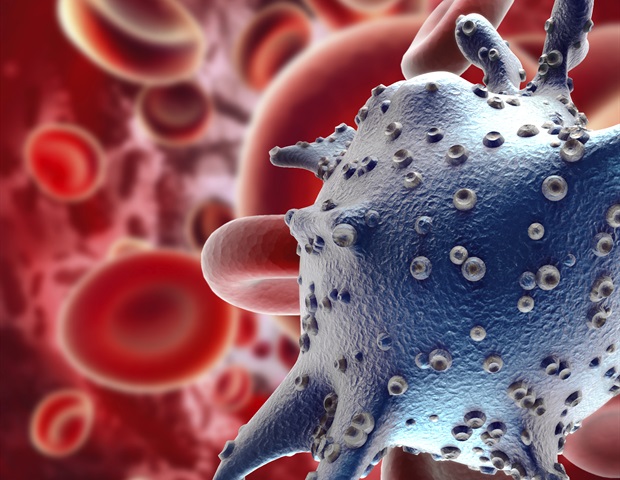Blood clots form in response to signals from the lungs of cancer patients—not from other organ sites, as previously thought—according to a...
Vous n'êtes pas connecté
- English
- Français
- عربي
- Español
- Deutsch
- Português
- русский язык
- Català
- Italiano
- Nederlands, Vlaams
- Norsk
- فارسی
- বাংলা
- اردو
- Azərbaycan dili
- Bahasa Indonesia
- Հայերեն
- Ελληνικά
- Bosanski jezik
- українська мова
- Íslenska
- Türkmen, Түркмен
- Türkçe
- Shqip
- Eesti keel
- magyar
- Қазақ тілі
- Kalaallisut ; kalaallit oqaasii
- Lietuvių kalba
- Latviešu valoda
- македонски јазик
- Монгол
- Bahasa Melayu ; بهاس ملايو
- ဗမာစာ
- Slovenščina
- тоҷикӣ ; toğikī ; تاجیکی
- ไทย
- O'zbek ; Ўзбек ; أۇزبېك
- Tiếng Việt
- ភាសាខ្មែរ
- རྫོང་ཁ
- Soomaaliga ; af Soomaali
 Maroc - NEWS.MEDICAL.NET - A la Une - 20/Feb 18:54
Maroc - NEWS.MEDICAL.NET - A la Une - 20/Feb 18:54
Breakthrough discovery unveils potential treatment for hepatitis B
In their effort to answer a decades-old biological question about how the hepatitis B virus (HBV) is able to establish infection of liver cells, research led by Memorial Sloan Kettering Cancer Center (MSK), Weill Cornell Medicine and The Rockefeller University identified a vulnerability that opens the door to new treatments.
Articles similaires
Lung signals trigger blood clot formation in cancer patients
Blood clots form in response to signals from the lungs of cancer patients—not from other organ sites, as previously thought—according to a...
Engineered blood vessel cells boost islet transplant success in diabetes treatment
Adding engineered human blood vessel-forming cells to islet transplants boosted the survival of the insulin-producing cells and reversed diabetes in a...
Enabling Impact Via Broader Understanding of Disease Prevention, Management
Study of Respiratory Infections and The Effectiveness of Treatments Dr.Hiam Chemaitelly is a Lebanese Assistant Professor of Research in Population...
Protein identified as key to preventing fat build-up and related diseases
Accumulation of fat molecules is detrimental to the cell. Researchers from the Yong Loo Lin School of Medicine, National University of Singapore (NUS...
More Than 200 High School Students Participate in WCM-Q Research Competition
This year’s edition of the Weill Cornell Medicine-Qatar (WCM-Q) High School Research Competition (HSRC) brought together 214 students from 31 high...
Vaccine Shows Promise for Pancreatic Cancer, Study Finds
FRIDAY, Feb. 21, 2025 -- Adding a personalized mRNA vaccine to standard treatment could offer new hope for pancreatic cancer patients, a small yet...
Nvidia unveils powerful AI system for genetic research
AI chipmaker Nvidia and research partners have created what they call the largest artificial intelligence system yet for biological research, the...
14-Year-Old Boy Fatally Stabbed During Brawl Outside a NYC McDonald’sFREEDOMNEWS.TV
February 15, 2025 QUEENS, New York – A teen boy did not survive his injuries after being stabbed multiple times at a New York City McDonald’s on...
Les derniers communiqués
-
Aucun élément





